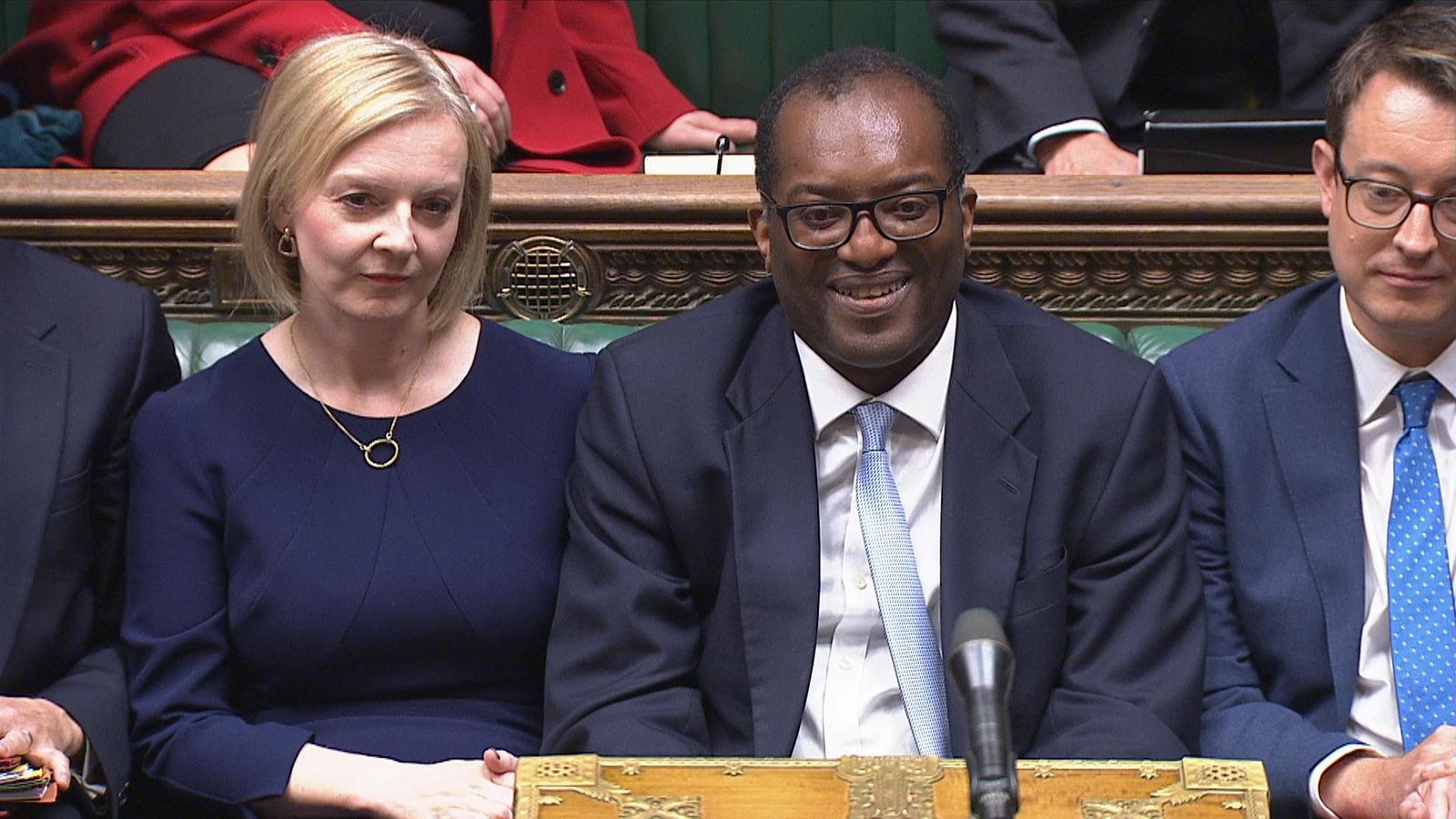Liz Truss sticks by plan but admits mistakes, and says top-rate tax cut was chancellor’s idea


Liz Truss has admitted that she “should have laid the ground better” for the government’s tax-cutting mini-budget after the pound slumped to a record low.
The prime minister said she has “learnt from that” and “will make sure in future we will do a better job of laying the ground”.
Ms Truss also doubled down on the decision to remove the top rate of income tax (45%) as “it’s part of an overall package of making our tax system simpler and lower” – but admitted the policy was not discussed with the cabinet.
“It was a decision that the chancellor made,” she said.
Liz Truss stands by mini-budget – Politics latest
Ms Truss told the BBC’s Sunday with Laura Kuenssberg programme: “I do stand by the package we announced and I stand by the fact that we announced it quickly.”
It comes after the cost of government borrowing spiked following the fiscal event last month.
Stressing that her government has “a very clear plan”, Ms Truss said she understands “how worried people are” as the country faces a “turbulent and stormy time”.
The PM later repeatedly refused to answer whether there will be spending cuts to public services under her government and declined to commit to rising benefits in line with inflation.
Advertisement
“This is something the work and pensions secretary is looking at,” she said.
Meanwhile, Conservative Party chairman Jake Berry said “markets can overreact” to new economic policy.
“Let’s see where the markets are in six months’ time,” he told Sky News’s Ridge on Sunday programme.
Please use Chrome browser for a more accessible video player
0:21
‘Cut consumption or get a new job’
Mr Berry also confirmed that Conservative MPs who vote against the government’s plan for tax cuts will lose the whip.
It has been reported that some Tory MPs are preparing to vote with Labour to prevent measures announced by the chancellor on 23 September, including abolishing the top rate of income tax.
In a sign that the leadership is now indeed on a collision course with many of its own MPs over the mini-budget, former cabinet minister Julian Smith posted on social media: “The first job of an MP is to act in the interest of their constituents and in the national interest. We cannot clap for carers one month and cut tax for millionaires months later.”
Mr Berry also urged Tory MPs to unite behind Ms Truss and her programme, saying she had “a mandate both from colleagues and our membership”.
“I’m sure that if we do that it will lead ultimately to long-term electoral success,” he said.
Read more:
Labour surges to record lead in polls
Devolved nations demand meeting with chancellor as Tory top team double down
Conservative Mayor of the West Midlands, Andy Street, added that the government’s mini-budget showed “good leadership”.
“You can’t go on year after year without reviewing your core. That is good business. It’s good leadership,” he told Sky News’s Ridge on Sunday programme.
Please use Chrome browser for a more accessible video player
2:31
Govt: No U-turn on tax plan
He continued: “So a different way of thinking was required. And the huge majority of investment in the financial statement was about that different way of thinking.”
But former cabinet minister Michael Gove accused Ms Truss’s plans of having the “wrong values” and hinted that he could vote against the tax-cutting measures in the Commons.
Mr Gove told the BBC Ms Truss was right to acknowledge that “there needs to be a recognition of mistakes”, adding: “But it is still the case that there is an inadequate realisation at the top of government about the scale of change required.
“Yes, the energy package was the most important thing in the fiscal event, but broadly 35% of the additional money that we are borrowing is not to cut energy costs, it is for unfunded tax cuts.”
But the PM vowed to “win the hearts and minds” of Tory MPs over her growth plan.
Ms Truss also ruled out publishing forecasts from the independent Office of Budget Responsibility ahead of the chancellor’s mid-term plan on 23 November.
While she argued that the government “simply didn’t have time” to publish OBR data alongside Mr Kwarteng’s mini-budget.
Read more:
A lesson from ‘Reaganomics’: Collision of theory and reality could prove fatal for PM and Tory party
Please use Chrome browser for a more accessible video player
5:59
Liz Truss ‘a danger to the economy’
It comes as Ms Truss and the Tories’ approval ratings again plummeted in a fresh poll – as Labour jumped to a 19-point lead.
The Opinium poll showed 55% of voters disapprove of the new prime minister and just 18% approve, which is worse than Boris Johnson’s final days in office.
Me Kwarteng is no more popular after the pair doubled down on economic policies announced last week, with 55% also disapproving of him and 27% approving.
Mr Berry shrugged off the significant Labour leads in recent polls, telling Sky News they would look “very different” closer to the election.